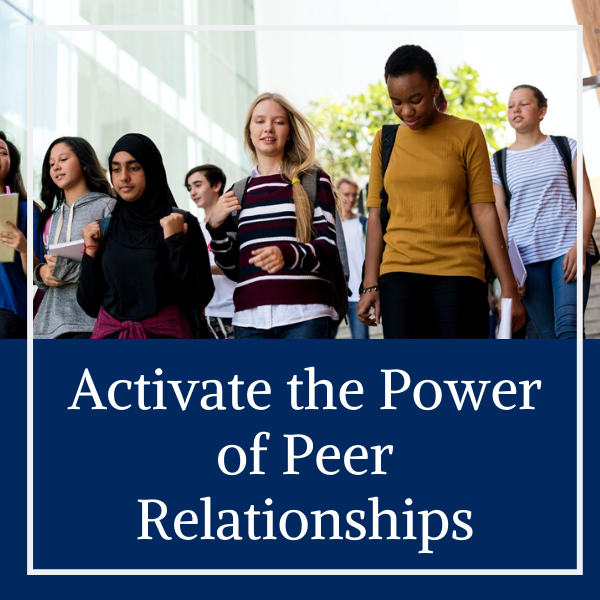Blog
Relational Mindsets Are a Foundation of Relationship-Rich Organizations
Is it time for some positive climate change in your school or organization?
Building strong relationships with young people doesn’t happen accidentally. It takes conscious effort to create a climate where youth‑adult relationships are intentional, inclusive, and equitable.
Search Institute’s Rooted in Relationships model is a way of understanding the relational mindsets, skills, and actions required to create relationship‑rich organizations.
Building Quality Relationships
“I make it a point that every interaction is building a relationship...I’m in the hallway every time there’s a passing period, I’m in the cafeteria the entire duration of lunch, I’m in the hall prior to school, at the end of school, putting myself in relationship‑building opportunities.”—School leader, Twin Cities Metro
To learn, grow, and thrive in school and out-of-school time spaces, young people need high‑quality relationships with their peers and staff. And staff need to nurture relationships with each other and with the organization's leadership.
We call this a web of relationships.
An organization with a strong web of relationships provides the ideal conditions for youth and adults to build authentic and positive relationships with each other.
Search Institute’s The State of Relationships case study took a look at the quality of relationships in schools and out‑of‑school (OST) programs.
The findings show room for improvement.
What We’re Learning
Overall, study participants rated the quality of their relationships as moderately strong. On a scale of Weak (0) to Strong (10), the relationships all fell between 6 and 7.
-
Staff‑Leader: 6.4
-
Among Youth: 6.5
-
Youth‑Staff: 6.9
-
Among Staff: 7.0
Not bad, right? But with intentional, purposeful strategies in place, these relationships can move past “okay” to create a climate where relationship‑building is at the center of the mission.
The Developmental Relationships Framework
We define developmental relationships as close connections through which young people discover who they are, gain abilities to shape their own lives, and learn how to interact with and contribute to the world around them.
The developmental relationships framework is a research‑based guide for helping adults think about how to intentionally build strong relationships with young people. The framework identifies five elements that make up developmental relationships: express care, challenge growth, provide support, share power, and expand possibilities.
Here we’ve got some good news—and a caveat. More than 80% of school and OST staff and leaders reported that they agree or strongly agree that staff intentionally engage in the five elements of a developmental relationship. They also said that the elements are somewhat or very important to their organization’s mission.
-
93% express care by showing youth they matter
-
91% provide support by helping youth accomplish tasks or reach their goals
-
87% challenge growth by encouraging youth to do their best
-
83% expand possibilities by introducing young people to new experiences or opportunities
-
82% share power by listening to young people’s ideas and taking them seriously
The caveat is that other studies have shown a gap between what staff and leaders think they are doing to build relationships and what young people experience.
There is also a good chance that not all groups of youth are experiencing intentional, purposeful developmental relationships in these settings. For example, Search Institute research has shown that youth from low-income backgrounds tend to report weaker relationships with their teachers than their more affluent peers.
Now that we have an idea of what is going on, what steps are staff and leaders taking to intentionally cultivate a relational climate in their schools and programs?
4 Relational Climate Indicators
What kinds of things are school and OST staff and leaders doing in their day-to-day interactions with youth to intentionally improve relationships and create fertile ground for relationship building?
-
A majority (78%) report that they spend time and energy thinking about what is working and how to improve their relationships with youth.
-
A similar percentage (75%) say they intentionally include activities specifically designed to build relationships.
Relationship‑building efforts tend to flourish when the following four elements are present. Here’s how school and OST staff and leaders felt their organizations were doing in these key areas.
-
Psychological safety. Feeling psychologically safe is the foundation for trust. Young people thrive in settings where they feel comfortable being their authentic selves, and where they feel respected and accepted. About 79% of participants say that staff are intentional about creating these kinds of safe spaces.
-
Accountability. Young people need to know what the rules and expectations are. Environments that clearly and consistently communicate expectations provide space for growth. About 80% of participants say their organizations provide clear rules and expectations.
-
Shared sense of community. Approximately 76% of respondents say their schools or programs are intentionally creating classrooms and programs where youth feel a part of a larger community.
-
Youth‑Centered. Giving young people a say in decision‑making is key to building their sense of connectedness and belonging. 70% of participants felt they were giving youth a voice.
”As educators, we have a lot to teach and pass down, but the information and knowledge that youth have is just as valuable and relevant, right?”—OST Staff, Twin Cities Metro
Moving Forward with Intention
There is much forward momentum when it comes to understanding the importance of relationship building in schools and OST programs.
And it seems like actions are catching up with intentions. Many leaders and staff are aware and actively seeking ways to express care, provide support, challenge growth, expand possibilities, and share power.
But there’s always more to do.
We take heart from the data showing that large majorities of staff and leaders are working every day to cultivate a relationship-centered school and OST climates.




